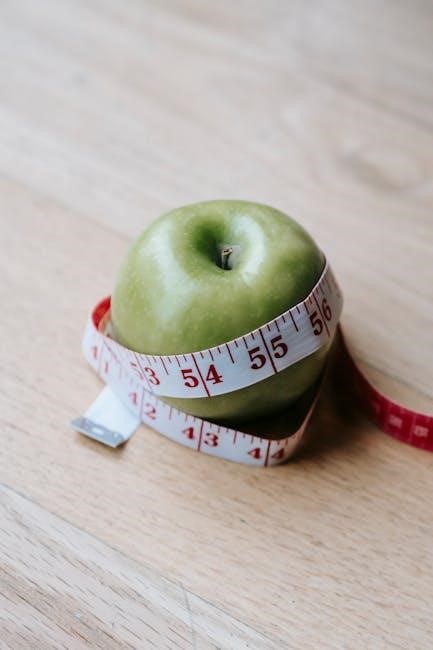A structured yet flexible approach to healthy eating, the 1700 Calorie Meal Plan emphasizes balanced macronutrients, whole foods, and portion control to support weight loss and overall wellness.
Overview of the Plan
The 1700 Calorie Meal Plan is a structured approach to daily eating, designed to promote weight loss and overall health. It focuses on balanced macronutrients, portion control, and nutrient-dense foods. The plan includes breakfast, lunch, dinner, and snacks, with flexibility to customize based on personal preferences and dietary needs. Meals are tailored to provide adequate protein, healthy fats, and complex carbohydrates, ensuring satisfaction and energy. A printable PDF version is available for easy tracking and meal planning.
Why 1700 Calories?
A 1700-calorie diet strikes a balance between weight loss and nutrient intake, creating a sustainable calorie deficit. It is ideal for individuals with a moderate activity level or those seeking gradual weight loss. This calorie intake supports energy needs while promoting fat burning, making it suitable for long-term adherence. The plan ensures adequate nutrition without excessive restriction, fostering a healthy relationship with food and aiding in maintaining muscle mass during weight loss.
Who Is This Plan For?
This plan is designed for individuals seeking a structured approach to weight loss or improved nutrition. It suits those with a moderate activity level, particularly adults looking to create a calorie deficit without extreme restriction. The plan is ideal for beginners and intermediate dieters, offering flexibility to accommodate different lifestyles and dietary preferences. It’s also suitable for those over 45, focusing on balanced meals that support overall health and wellness while promoting gradual, sustainable weight loss.

Benefits of a 1700 Calorie Diet
A 1700-calorie diet promotes steady weight loss, improves nutrient intake, and boosts energy levels by focusing on balanced meals and a sustainable calorie deficit.
Weight Loss
A 1700-calorie diet creates a calorie deficit, essential for weight loss. By consuming fewer calories than burned, the body uses stored fat for energy. This plan promotes gradual, sustainable weight loss while maintaining muscle mass through adequate protein intake; Balanced meals with fiber-rich foods keep you full longer, reducing cravings. Consistency is key, as the deficit leads to visible results over time, helping you achieve your weight loss goals effectively and healthily. This structured approach ensures steady progress without extreme deprivation;
Improved Nutrient Intake
The 1700-calorie meal plan focuses on nutrient-dense foods, ensuring you meet daily vitamin, mineral, and fiber requirements. Whole grains, lean proteins, and colorful vegetables are emphasized, providing essential antioxidants. This approach helps maintain energy levels and supports overall health. By prioritizing quality over quantity, the plan promotes better digestion and reduces the risk of nutrient deficiencies, fostering a balanced and nutritious diet tailored for long-term wellness.
Increased Energy Levels
A 1700-calorie meal plan with balanced macronutrients ensures sustained energy throughout the day. By incorporating complex carbohydrates, lean proteins, and healthy fats, the diet supports stable blood sugar levels. This prevents energy crashes and keeps you feeling vibrant. Meals are designed to fuel your body efficiently, helping you maintain activity levels and mental clarity without fatigue. Balanced nutrition is key to unlocking your full energy potential and supporting an active lifestyle.

Key Considerations for Success
Adherence to balanced macronutrients, proper hydration, and consistent meal timing are crucial for maximizing results and maintaining overall health on a 1700-calorie meal plan.
Balanced Macronutrients
A 1700-calorie plan requires careful distribution of proteins, carbs, and fats to ensure satiety and energy. Aim for 25-30% protein, 40-50% carbs, and 25-30% fats, focusing on whole, nutrient-dense foods like lean proteins, whole grains, and healthy fats. This balance supports muscle maintenance, steady energy levels, and overall metabolic health, making the diet sustainable and effective for weight loss and improved nutrition.
Meal Frequency
Eating smaller, frequent meals throughout the day can enhance metabolism and maintain energy levels. Aim for three main meals and 2-3 snacks, ensuring balanced portion sizes to stay within the 1700-calorie limit. This approach prevents excessive hunger and supports steady nutrient absorption. By spacing meals evenly, you maintain stable blood sugar levels, which is key for sustained energy and weight management. Adjusting meal frequency based on activity levels and personal needs helps optimize the plan’s effectiveness. Consistency is key to achieving desired results.
Hydration
Staying hydrated is crucial for overall health and weight management. Aim to drink 6-8 glasses of water daily, as it aids digestion and boosts metabolism. Herbal teas, black coffee, or low-fat milk are also great options. Avoid sugary beverages to prevent excess calorie intake. Proper hydration supports energy levels and helps maintain portion control, making it easier to stick to the 1700-calorie plan. Incorporate fluids throughout the day to stay refreshed and optimize the effectiveness of your meal plan.
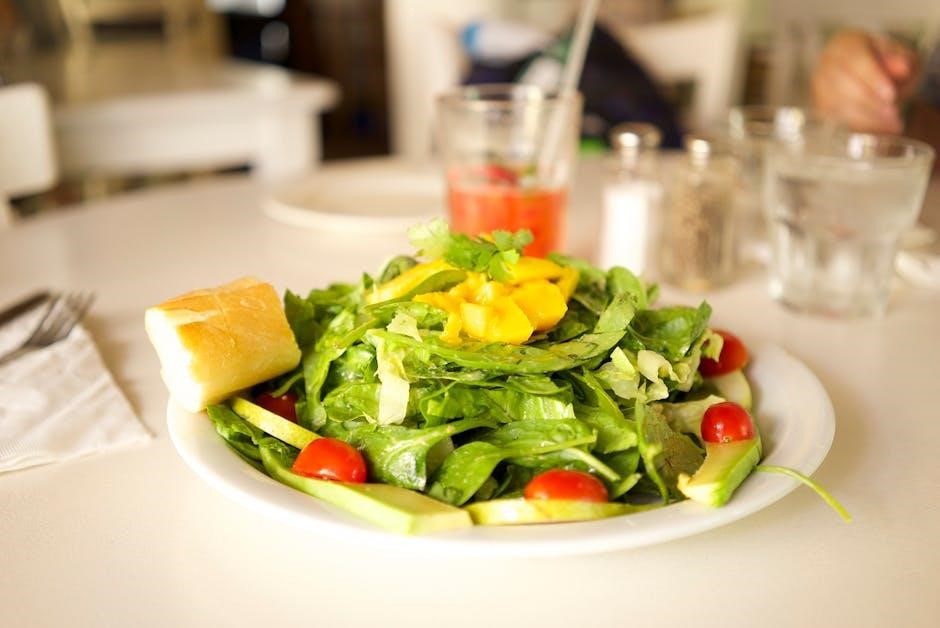
Structure of the Meal Plan
Organized into breakfast, lunch, dinner, and snacks, the plan ensures balanced macronutrients, portion control, and variety, making it easy to follow and sustainable for weight loss.
Breakfast Options
Start your day with nutrient-rich breakfast options like a Green Protein Shake with Wasa crackers and blueberries, or a Veggie Omelet with coconut oil and organic eggs. These meals provide balanced macronutrients, healthy fats, and complex carbs to keep energy levels steady. Incorporate fiber-rich foods like whole grain toast or avocado for added satiety. Portion control is key to staying within the 1700-calorie goal. Choose options that are both satisfying and nutritious to kickstart your day on the right track.
Lunch Ideas
Opt for quick, nutritious lunches like grilled chicken salads or whole-grain wraps with lean turkey. A mixed green salad with roasted veggies and a light vinaigrette is another excellent option. Soups, such as lentil or vegetable-based varieties, provide fiber and satisfaction. Pair meals with a side of fresh fruit or a small portion of nuts for added crunch and nutrients. Ensure portion sizes align with your calorie goals while maintaining a balance of protein, carbs, and healthy fats.
Dinner Recipes
Dinner should focus on lean proteins and colorful vegetables for a satisfying meal. Try grilled chicken breast with roasted vegetables like asparagus and bell peppers, seasoned with herbs. Baked salmon with quinoa and steamed broccoli is another nutrient-rich option. Vegetable stir-fries with tofu or shrimp, cooked in a light soy sauce, are quick and flavorful. Include a side salad for added fiber. Pair these dishes with a small portion of whole grains to round out your meal and meet your calorie goals.
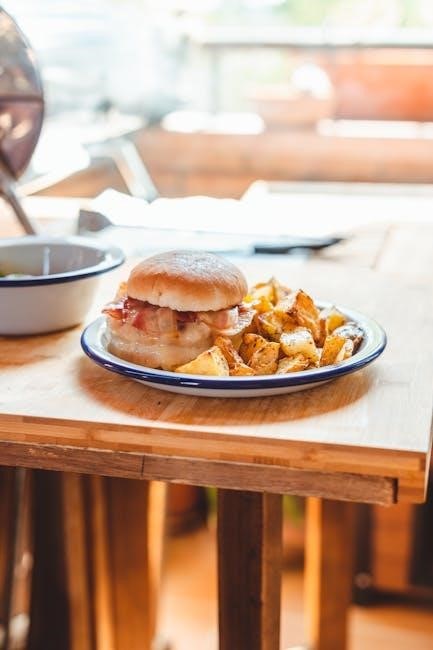
Snack Choices
Snacks should be light, nutrient-dense, and low in empty calories. Opt for fresh fruits like apples or berries, paired with a handful of almonds for healthy fats. Greek yogurt with a drizzle of honey or a sprinkle of chia seeds is another excellent option. Veggie sticks with hummus or a small portion of cottage cheese also make satisfying snacks. Keep portion sizes controlled to stay within your daily calorie goals while maintaining energy levels throughout the day.
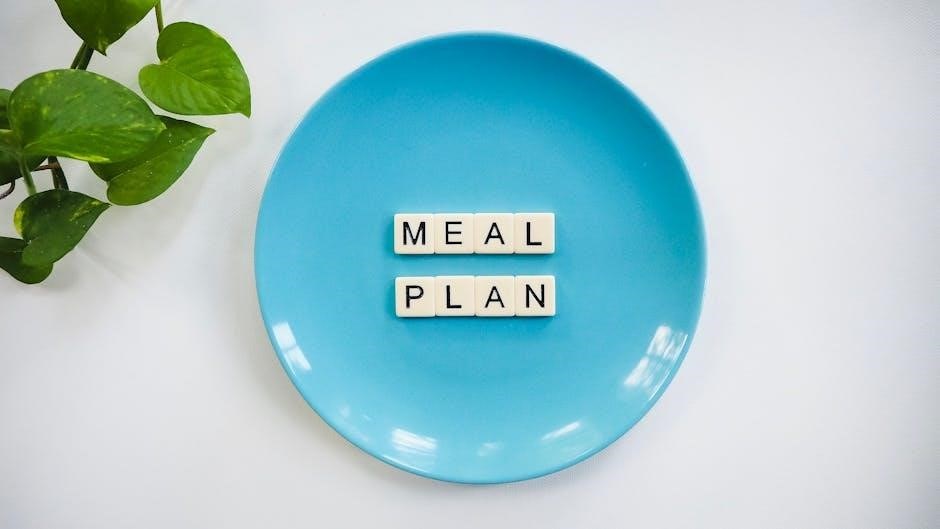
Sample Daily Meal Plan
A balanced 1700-calorie day includes a green protein shake for breakfast, grilled chicken salad for lunch, roasted salmon with veggies for dinner, and a Greek yogurt snack. Ensure portion control and nutrient variety to meet daily goals effectively. Include healthy fats, lean proteins, and whole grains while staying hydrated for optimal results.
Breakfast Example
Start your day with a green protein shake made with 2 scoops of protein powder, 1 cup spinach, and 1/2 cup unsweetened almond milk (180 calories, 20g protein, 5g fat, 10g carbs). Pair it with 1 slice of whole-grain toast topped with 1 tablespoon peanut butter (90 calories, 4g protein, 8g fat, 4g carbs). Add 1/2 cup fresh blueberries for antioxidants and fiber (40 calories, 1g protein, 0g fat, 11g carbs). This balanced breakfast totals 310 calories, providing sustained energy and nutrient-dense start to your day.
Lunch Example
Enjoy a grilled chicken breast (4 oz, 120 calories, 25g protein, 3g fat, 0g carbs) with 1/2 cup quinoa (100 calories, 4g protein, 2g fat, 20g carbs) and 1 cup steamed broccoli (55 calories, 2g protein, 0g fat, 11g carbs). Add a small side salad with mixed greens, cherry tomatoes, and a light vinaigrette (70 calories, 2g protein, 7g fat, 5g carbs). This meal totals 345 calories, offering lean protein, fiber, and healthy fats to keep you energized and satisfied.
Dinner Example
Savor a 5-ounce grilled salmon fillet (180 calories, 35g protein, 10g fat, 0g carbs) with 1/2 cup brown rice (110 calories, 2g protein, 2g fat, 25g carbs) and 1 cup roasted asparagus (25 calories, 3g protein, 0g fat, 5g carbs). Add a small side of sautéed spinach with garlic (20 calories, 2g protein, 0g fat, 3g carbs). This balanced meal totals 335 calories, providing lean protein, healthy fats, and complex carbs for sustained energy and weight loss support.
Snack Example
Enjoy a small apple (95 calories, 0.3g protein, 0.5g fat, 25g carbs) paired with 1 tablespoon of peanut butter (95 calories, 4g protein, 8g fat, 4g carbs). This snack provides 190 calories, 4.3g protein, 8.5g fat, and 29g carbs. The combination of fiber from the apple and healthy fats from peanut butter keeps you satisfied while supporting your weight loss goals. It’s simple, nutritious, and easy to prepare on the go.

Macronutrient Breakdown
The 1700-calorie meal plan typically allocates 40% of calories to carbohydrates, 30% to protein, and 30% to fats, ensuring balanced nutrition for weight loss and energy.
Protein
Protein is a cornerstone of the 1700-calorie meal plan, typically accounting for 30% of daily calories. It supports muscle maintenance, satiety, and weight loss. Aim for 120-150 grams daily, sourced from lean meats, fish, eggs, dairy, and plant-based options like legumes or tofu. High-protein breakfasts, such as egg white omelets or Greek yogurt, kickstart metabolism. Incorporate protein-rich snacks like cottage cheese or a protein shake to maintain energy levels throughout the day, ensuring overall nutritional balance and satisfaction.
Carbohydrates
Carbohydrates make up 45-50% of the 1700-calorie meal plan, focusing on whole, unprocessed sources like whole grains, vegetables, and fruits. These provide essential fiber, vitamins, and minerals while supporting energy levels. Opt for low-glycemic options such as oats, quinoa, and sweet potatoes to maintain steady blood sugar levels. Pairing carbs with protein and healthy fats enhances satiety and balances macronutrient intake, ensuring sustained energy and nutrient-dense meals that align with weight loss and overall health goals.
Fats
Fats contribute 25-30% of the 1700-calorie plan, emphasizing healthy, unsaturated sources like avocados, nuts, seeds, and olive oil. These fats support hormone production, satiety, and nutrient absorption. Saturated fats, such as coconut oil or dairy, are included in moderation. Balancing fats with lean proteins and complex carbs ensures a satisfying and nutritionally complete diet, aiding in weight management and overall health without compromising flavor or variety in meals.

Customizing the Plan
Tailor the 1700-calorie plan to suit individual preferences and dietary needs by adjusting portion sizes, swapping ingredients, and incorporating personal favorites while maintaining nutritional balance and flavor variety.
Adjusting Calorie Intake
Calorie intake can be adjusted based on individual goals and progress. For weight loss, a deficit of 500 calories per day is often recommended, leading to a weekly loss of 1-2 pounds. Increasing physical activity or reducing food portions can help achieve this deficit. However, it’s important to maintain a minimum of 1,200 calories for women and 1,600 for men to ensure proper nutrition and avoid muscle loss. Regular monitoring and adjustments are key to sustained results and overall health.
Swapping Ingredients
Swapping ingredients is a great way to customize your 1700-calorie meal plan while maintaining nutritional balance. For example, exchange lean proteins like chicken for turkey or fish, and substitute healthy fats like avocado for nuts. Whole grains can be swapped with low-carb alternatives, and vegetables can be interchanged based on preference. This flexibility ensures meals stay enjoyable and tailored to your taste, helping you stick to the plan without feeling restricted. It also allows for accommodating dietary preferences or ingredient availability.
Accounting for Dietary Restrictions
Adapting the 1700-calorie meal plan to fit dietary restrictions is straightforward. Vegetarians can replace meat with plant-based proteins like beans or tofu, while vegans can opt for dairy-free alternatives. Gluten-free options include swapping wheat products for rice or quinoa. For dairy-free diets, choose almond or oat milk and non-dairy cheeses. Ensure substitutions maintain calorie and nutrient balance to support weight loss and overall health goals. This flexibility makes the plan accessible for various dietary needs while keeping meals satisfying and nutritious.

Tracking Progress
Monitor your journey with a food diary, track weight loss, and adjust the plan as needed to maintain motivation and ensure steady progress toward your goals.
Using a Food Diary
A food diary is a powerful tool for tracking daily meals and staying accountable. By recording each meal, portion sizes, and hunger levels, you can identify patterns and areas for improvement. This helps maintain consistency with your 1700-calorie goal and ensures nutrient balance. Regularly reviewing your diary allows you to make informed adjustments and celebrate progress, keeping you motivated and focused on your health objectives.
Monitoring Weight Loss
Regularly monitoring weight loss helps track progress and stay motivated. Weigh yourself weekly, ensuring consistent conditions for accurate results. Aim for a steady weight reduction of 1-2 pounds per week. This gradual loss supports sustainability and overall health. Remember, weight loss plateaus are normal, but consistent adherence to the 1700-calorie plan will help overcome them. Celebrate small milestones to maintain motivation and adjust habits as needed to achieve your goals effectively.
Adjusting the Plan as Needed
Flexibility is key to long-term success. If weight loss slows, consider reducing daily calories by 100-200 or increasing physical activity. Swap ingredients or portion sizes to keep meals interesting and tailored to your preferences. Adjusting macronutrient ratios, such as boosting protein or reducing carbs, can also reignite progress. Remember, consistency is more important than perfection. Regularly assess your needs and make mindful changes to stay on track with your weight loss and health goals.
The 1700 calorie meal plan offers a balanced, sustainable approach to weight loss and improved health, helping you achieve your goals with ease and flexibility.
Final Thoughts
The 1700 calorie meal plan is a practical and effective way to achieve weight loss while maintaining nutrient balance. With a focus on whole foods and portion control, it supports sustainable progress. Customizable options ensure flexibility, catering to various dietary needs and preferences. Consistency and patience are key to maximizing results, helping you reach your fitness goals and improve overall health. This plan is not just a diet but a stepping stone toward a healthier, more energetic lifestyle.
Next Steps
Download the printable PDF version of the 1700 calorie meal plan to start your journey. Begin with the sample meal ideas and adjust based on your progress. Track your intake and monitor weight loss regularly. Stay consistent, and if needed, consult a nutritionist for personalized tweaks. This plan is designed to be adaptable, ensuring long-term success and healthier habits. Take the first step today and embrace a balanced, energized lifestyle with sustainable results.
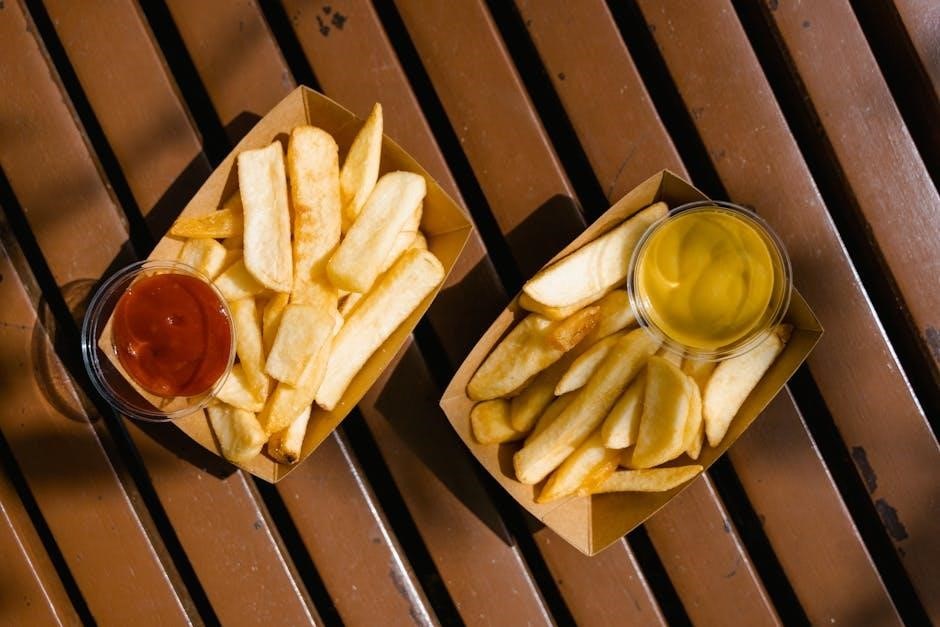
Printable PDF Version
Download the easy 1700 calorie meal plan PDF for a comprehensive guide to healthy eating. This free resource includes daily meal ideas, recipes, and macronutrient breakdowns. Perfect for planning ahead, it offers flexibility and structure to support your weight loss goals. Print it out or access it digitally to stay organized and focused on your journey to a balanced lifestyle. The PDF is designed to be user-friendly, ensuring you can easily follow the plan and achieve sustainable results.
